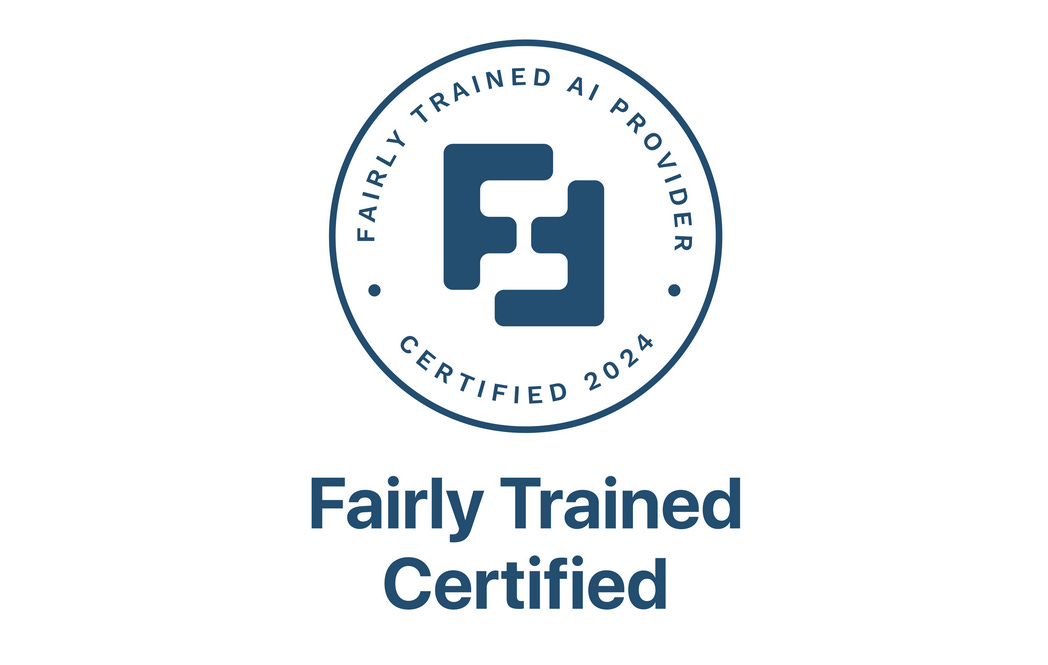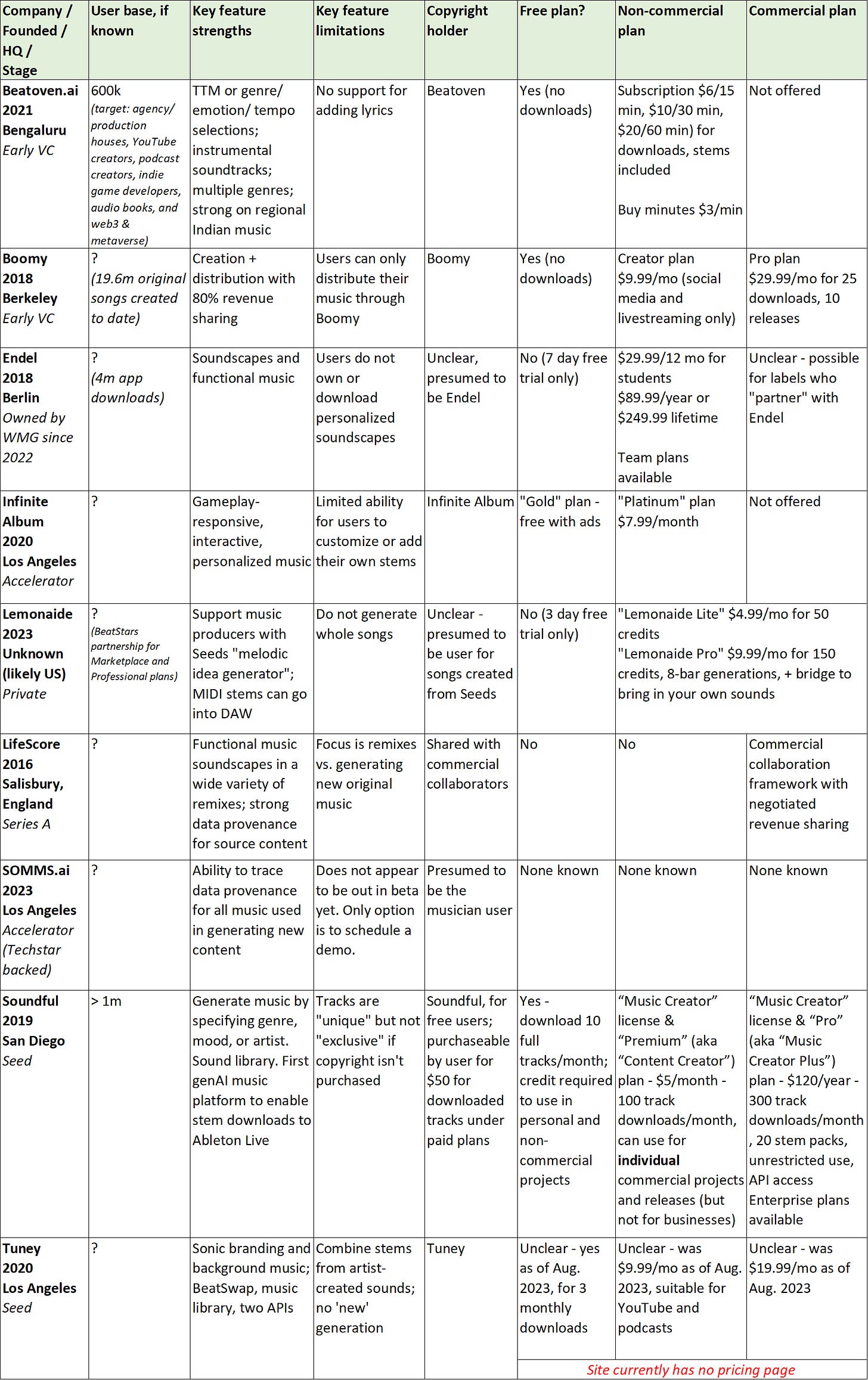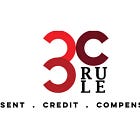9 ethical genAI music tools [Unfair Use? series, PART 3] 🗣️
Looking for an ETHICAL generative AI-based tool for creating music? Check out this annotated list of 9 companies who have been certified as Fairly Trained. (audio; 9:07)
This article overviews companies working on generative AI for music who have been certified as Fairly Trained, and shares profiles on 9 of them. It supports the upcoming PART 3 in our 8-part series “Unfair Use? Ethics of generative AI for music”, announced in this INTRODUCTION post on .
None of the big, well-known firms or other smaller players are certified yet as Fairly Trained. Many have obvious red flags on AI ethics. If you’re curious to learn about their ethical postures, keep an eye out for the upcoming parent PART 3 article, profiles on major un-certified companies, and the remainder of the series. Subscribe to be notified when new articles on AI are published (it’s FREE):

This article is not a substitute for legal advice and is meant for general information only.
Ethics in generative AI for music
Our goal is to help shed light on the ethical positions of the vast and growing field of competitors offering products leveraging generative AI for creating musical melodies.
What’s UNETHICAL in use of generative AI for music? At a minimum: use of unlicensed music, including voices, without “3Cs (consent, credit, and compensation” or the “4Cs” (adding control) for contributing artists 1. (See PART 2 and PART 3 for more specifics.)
Startup “Fairly Trained”2 focuses on verifying whether a product based on a genAI model has been developed ethically. It was launched by Ed Newton-Rex (former head of audio at Stability AI) in January 2024.
At launch time, 8 of the 9 initially-certified companies were in the AI music space: Beatoven, Boomy, Endel, LifeScore, Rightsify, SOMMS.ai, Soundful, and Tuney. 3
As of May 18, 2024, 5 additional companies involved with generative AI for music have had their models certified as Fairly Trained: Frostbite Orckings, Infinite Album, KL3M, Lemonaide, and VoiceMod. 4
What jumped out to me from the Fairly Trained list:
Along with many other smaller companies, NONE of the big players in generative AI are certified yet (not even for just their music offerings).
It’s clearly possible that some companies who are operating ethically have not yet undertaken or completed the certification process. When we analyzed AI-based voice cloning tools in our April 28 article, we called out 5 companies that seemed likely to be operating ethically, and we shared a deeper dive on 3 of them in this May 9 article.
Other approaches to verifying ethicality of AI-generated music are now emerging as well, e.g. the May 21 announcement by Voice-Swap5 and BMAT (“the operating system for the music industry”)6 on a partnership to use technology to verify music sources. 7
Regardless, companies who are leading the way in ethical behavior in this aspect of their AI music business are fighting an uphill battle against the “QDPs” (Questionable Data Practice” companies, as
named them in his May 22 Substack article on Suno). Our position here at is that:Companies behaving ethically deserve extra recognition and consideration, and
Potential genAI music tool users deserve support on learning about the ethical AI companies and what they offer.
We’re here to support the ethical genAI music companies and to support all of you who want to enjoy using genAI tools without being unethical or unfair to musicians.
I wanted to research these ethical companies anyway to help me decide which genAI music tools to try. I’m sharing my findings here in hopes that they will be useful to others, for evaluating whether these tools might fit your interests in ethically generating music with AI. Comments and suggestions are always welcome!
Profiles of Fairly Trained Companies
Of the 13 genAI music companies certified as Fairly Trained as of May 21, 2024, we will not profile the following four in detail:
Frostbite Orckings - a “purely virtual metal band whose music is created through the use of artificial intelligence”: genAI models are specific to this band only
KL3M - focus is foundation models, not specific to a genAI music product
Rightsify - focus is on licensing, not generating melodies
VoiceMod - focus is on voice cloning (which we profiled separately here)
The following newly-published profiles share details on the remaining nine companies currently certified as Fairly Trained. We collected information on Descriptions, History & Partnerships, Key Features, Training Data & Technologies, and Ownership, Usage Rights, & Pricing for:
Business and feature information about all 9 companies is summarized from the companies’ sites; LinkedIn; Crunchbase; PitchBook, where available; and publicly available reviews of one or more of these tools. Links are in the References section of each page.
Updates will be published as major announcements occur, as new companies become certified as Fairly Trained, or as other ethics certifications mature.
Summary
Key aspects of each of the 9 certified tools are summarized in the table below.
Bottom line: For my personal interests, I might experiment with Beatoven’s or Boomy’s free plans. However, Soundful’s free plan is my most logical choice.
I’m not currently interested in Twitch, interactive gaming tracks, or making my own soundscapes or functional music.
The quality is likely to be good enough for my envisioned soundtrack uses.
The price is right for my shoestring budget (10 downloads for free, 100 for $5/month).
I think 10 track downloads a month will do, at least at first, and I’m ok with giving credit to Soundful under the free plan while I get started.
“Your mileage may vary” depending on your musical interests 🙂
Is your main goal for reading this series to identify an ethical genAI music tool to use without concern about hurting musicians? Simply check out those 9 listed above. 😊
If you do try an ethical genAI music tool, we’d love to hear about what you learn! (Comment here, share a Note, or message me if you’d like to guest-post on 6 'P's in AI Pods)
What’s Next?
The Fairly Trained certification process is new this year. So far, nine companies are certified as Fairly Trained in the genAI music space for creating musical melodies, and alternative ethics certification mechanisms haven’t gotten off the ground yet.
The vast majority of companies working on generative AI for music are not yet confirmed to be operating ethically. A few look promising. Far more have glaring red flags regarding AI ethics. For others, we just don’t know enough yet about how they’re working with data and AI. I’m on a mission to find out and share it with you all.
This article on the Fairly Trained companies is the first post in PART 3, the WHO, WHAT, and WHEN of ethics for generative AI for music. The next posts in this series will include high-level profiles on other un-certified companies and separate profiles on 11 major un-certified companies. Deep dives into many aspects of AI ethics will follow for 7 major companies (in PARTs 4-7).
Of course, we’ll examine what’s known about how these major companies are sourcing the content they’re using for training, or how they are building their AI models. We will also explore how (or whether) they are addressing biases, if they are taking precautions about integrating user-supplied music that’s potentially unauthorized, and other aspects of AI ethics.
Want to learn and keep up with these major firms, and smaller players, who are not yet confirmed to be operating ethically with AI for music? Subscribe (for FREE) to be notified of our upcoming posts in this series on AI ethics for music (and on other AI topics) and to let me know that you support our work:
Thanks for reading - do let me know what you think, and if this article was helpful or interesting for you, or how future articles could be improved! (Likes, comments, Notes, and messages are all welcome and appreciated)
REFERENCES
Articles on AI ethics for music, by other Substack writers
on “QDPs” - Questionable Data Practice companies - and more:Links to articles
See this “AI for Music” page for a complete set of links to all posts and company profile pages in the article series on ethics of generative AI for music.
AI for Music
If you’re interested in the use of AI for music, you’re in the right place! Here you’ll find links to all of our articles on AI and music: Ethics of generative AI for music: what & for whom, when, how, why Profiles of individual companies using genAI in music creation toolsets
Bonus articles on voice cloning and vocal covers
End Notes
Credit for the 4Cs (consent, control, credit, compensation) phrasing goes to the Algorithmic Justice League (led by Dr. Joy Buolamwini).
Credit for the original 3Cs (consent, credit, and compensation) belongs to CIPRI (Cultural Intellectual Property Rights Initiative®) for their “3Cs' Rule: Consent. Credit. Compensation©.”
“Fairly Trained scheme to certify AI models ‘that get consent’ for training data”, by Stuart Dredge / Music Ally, 2024-01-18
“Voice-Swap and BMAT Launch New AI Technical Certification”, by Kristin Robinson / Billboard, 2024-05-21









![More than melodies: Ethics of generative AI for music [Unfair use? series, Part 3]](https://substackcdn.com/image/fetch/w_140,h_140,c_fill,f_auto,q_auto:good,fl_progressive:steep,g_auto/https%3A%2F%2Fsubstack-post-media.s3.amazonaws.com%2Fpublic%2Fimages%2Fce013f95-04ec-41e5-b145-f67e9122c811_6720x4480.jpeg)
![[PART 2] Unfair use? GenAI music ETHICAL RISKS & CHALLENGES](https://substackcdn.com/image/fetch/w_140,h_140,c_fill,f_auto,q_auto:good,fl_progressive:steep,g_auto/https%3A%2F%2Fsubstack-post-media.s3.amazonaws.com%2Fpublic%2Fimages%2Ff43d4635-1899-4964-b093-ced7dda4c29e_1600x1066.jpeg)
![[PART 1] Unfair use? Ethics of generative AI for music - WHY & FOR WHOM](https://substackcdn.com/image/fetch/w_140,h_140,c_fill,f_auto,q_auto:good,fl_progressive:steep,g_auto/https%3A%2F%2Fsubstack-post-media.s3.amazonaws.com%2Fpublic%2Fimages%2Fc06537a2-b301-4907-8b78-0aefdbdf57cf_1001x902.png)
![[INTRO] Unfair use? The ethics of generative AI for music](https://substackcdn.com/image/fetch/w_140,h_140,c_fill,f_auto,q_auto:good,fl_progressive:steep,g_auto/https%3A%2F%2Fsubstack-post-media.s3.amazonaws.com%2Fpublic%2Fimages%2F163f723a-f4fc-4701-84a8-3a81cad85775_4896x3264.jpeg)

![AI Ventriloquism: Send in the clones [Unfair use? series, Part 3]](https://substackcdn.com/image/fetch/w_140,h_140,c_fill,f_auto,q_auto:good,fl_progressive:steep,g_auto/https%3A%2F%2Fsubstack-post-media.s3.amazonaws.com%2Fpublic%2Fimages%2F7bc400e7-7489-4c1a-a4f5-5df0b4d21fc7_1990x1100.png)

Thank you so much for this great write-up, Karen!